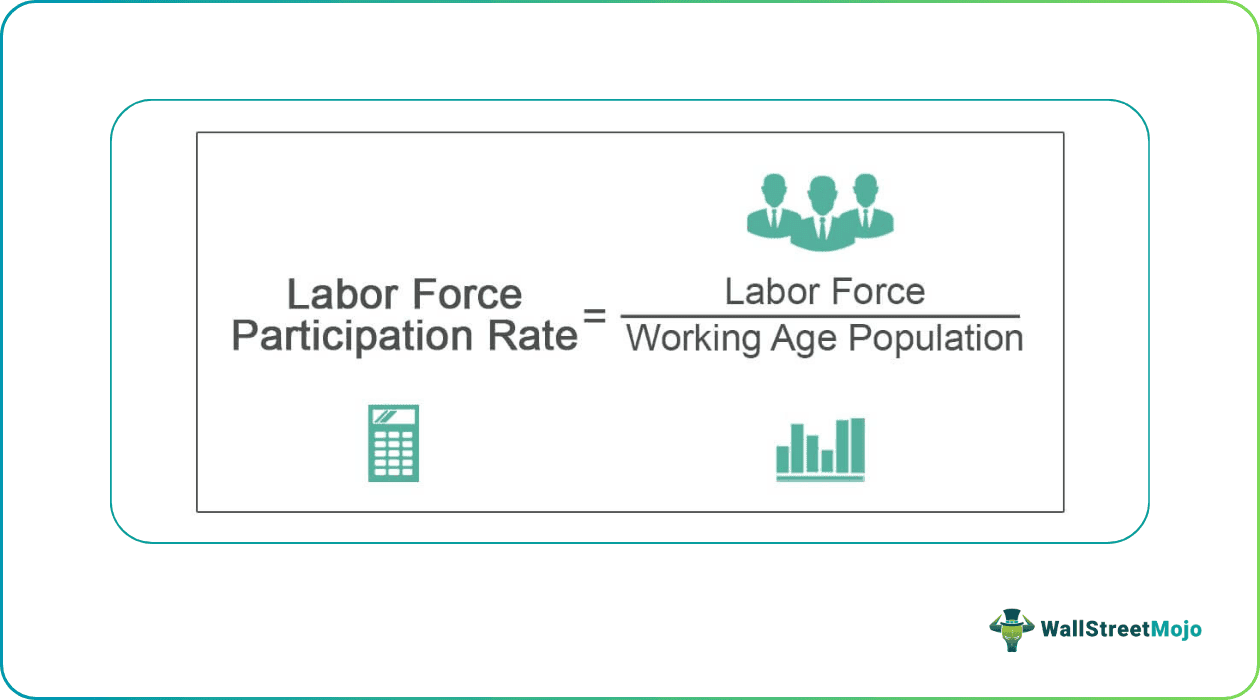Table Of Contents
Formula to Calculate Labor Force Participation Rate
The labor force participation formula refers to the formula used to calculate the active workforce of the economy concerning its total population. As per the formula, the labor force participation rate is calculated by dividing the total number of persons available for work by the total population.
Below given is the formula used to calculate the labor force participation rate:
Labor Force Participation Rate = Labor Force/Working Age Population

Where,
- The labor force is the sum of workers that are employed and unemployed.
Key Takeaways
- The labor force participation formula estimates the economy's workforce about its total population.
- According to the formula, the labor force participation rate is determined by dividing the person's total number accessible for labor by the total population.
- The high labor force participation rate ratio means the higher the nation's population is interested in working.
- As per most definitions, employed persons above 16 years of age generally exclude working in homemaking or self-service and volunteers. In addition, unemployed people shall exclude those who did not look for a job in the last four weeks.
- The working-age population should involve everyone other than minors below the age of 16, military personnel, and elderly care centers.
Calculation of Labor Force Participation Rate (Step-by-Step)
The formula for the labor force participation rate can be divided into the following steps:
- First, we need to identify the labor force, the summation of employed workers, whether on a salaried or self-basis.
- Most definitions define employed persons above the age of 16 and generally exclude those working in homemaking or self-service and volunteers.
- Unemployed people shall also exclude those who are less than 16 years of age and those who did not look for a job in the last four weeks.
- The working-age population shall include everyone except for minor persons below the age of 16, people in elderly care centers, and military personnel.
- When you sum up the employed and unemployed people that shall form the labor force and divide that result by working-age participation, the result will be the labor force participation rate.
Examples
Example #1
According to records, the working-age population of country XYZ was 233,450 thousand, the workers employed were 144,090 thousand, and unemployed workers were 11,766 thousand. Therefore, you must calculate the country XYZ's labor force participation.
Solution
Use the below-given data for the calculation of the labor force participation rate.
- Workers that are employed: 144090.00
- Unemployed workers: 11766.00
- Working-age population: 233450.00
Calculation of Labor Force

- = 144,090 + 11,766
- = 155,856
Therefore, the calculation of the labor force participation rate is as follows,

- = 155,856 / 233,450
Labor Force Participation Rate will be -

- = 66.76%
Example #2
Country PQR is an emerging nation and is a small country. It has recently adopted the US Bureau of Labor Statistics framework to calculate its labor force participation rate. The following details have been derived from a public domain maintained by the ministry of labor of the country.
- Total population of a country: 25344177.00
- People below minority age (16 yrs): 412766.00
- People in elderly care centers: 1323789.00
- Housewives solely looking for home activities: 7433901.00
- Self-employed people: 5333881.00
- Volunteers: 412766.00
As per the criteria, the working-age population shall exclude those they cannot employ, like people below 16 years of age, elders, and military citizens. The other labor force will avoid those they cannot engage.
Based on the above information, you must calculate the labor participation rate.
Solution
In this example, we are not directly given the labor workforce or working population.
Hence, we shall calculate the working-age population first by excluding minority-age people, militants, and elderly care centers.
Calculation of Working Age Population

- =25344177.00 - 412766.00 - 1323789.0
- =23607622.00
Now, we shall calculate the labor force where we must avoid housewives and volunteers they cannot employ.
Calculation of Labor Force

- =23607622-7433901-5333881-412766
- =10427074
Therefore, the calculation of the labor force participation rate is as follows:

= 10,427,074/ 23,607,622
Labor Force Participation Rate will be -

- = 44.17%
As per the definition in the example, the labor participation rate is 44.17%.
Example #3
McDonald's wants to open a new franchise, either in-country V or Z. The deciding criteria are to invest in a country with a youth population since it will prefer to employ them. Further, for their business, youth is chosen.
Below are the details for the two countries:
| Particulars | Country V | Country Z |
|---|---|---|
| Workers that are employed | 227044.00 | 216135.00 |
| Unemployed Workers | 17649.00 | 17649.00 |
| Working-age population | 1089115.00 | 1199705.00 |
| Labor Force | 244693.00 | 233784.00 |
The criteria are to select the country with a higher labor participation rate.
Solution
Country V
Therefore, the calculation of the labor force participation rate is as follows:

- = 2,44,693.00 /10,89,115.00
Labor Force Participation Rate will be -

= 22.47%
Country Z
Therefore, calculation of labor force participation rate is as follows,

- = 2,33,784.00 /11,99,705.00
Labor Force Participation Rate will be -

- = 19.49%
Labor Force Participation Rate Calculator
You can use this calculator to calculate the labor force participation rate.
Relevance and Uses
As stated earlier, we can define the labor force participation rate formula as the percentage of the working-age population, which is the share of the labor force. It measures what ratio and proportion of a nation's population are either actively looking for employment or employed. The higher the labor force participation rate ratio, which we can understand, the higher the nation's population is keen or interested in working.
We should analyze this ratio and unemployment data to understand the overall employment status better. There could be situations wherein recession, and the economy is really bad, there may be discouragement in labors to work which could mislead the results.

